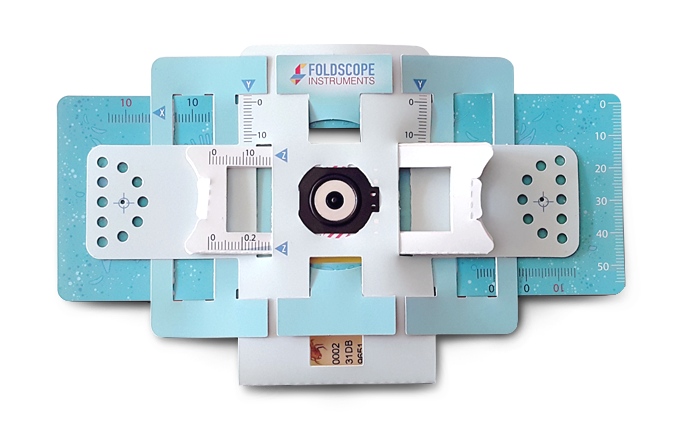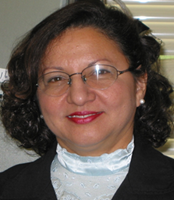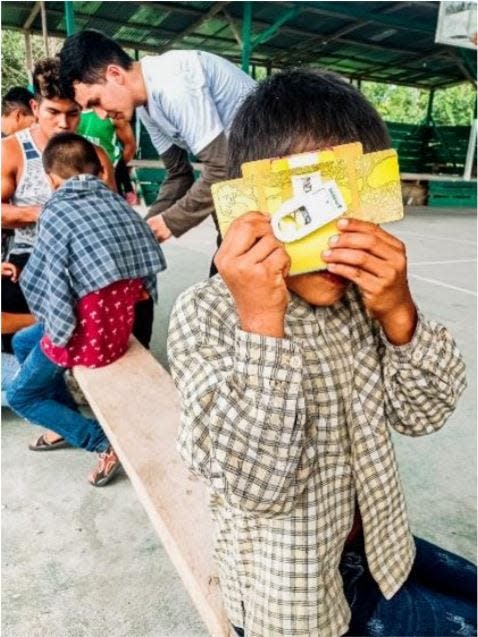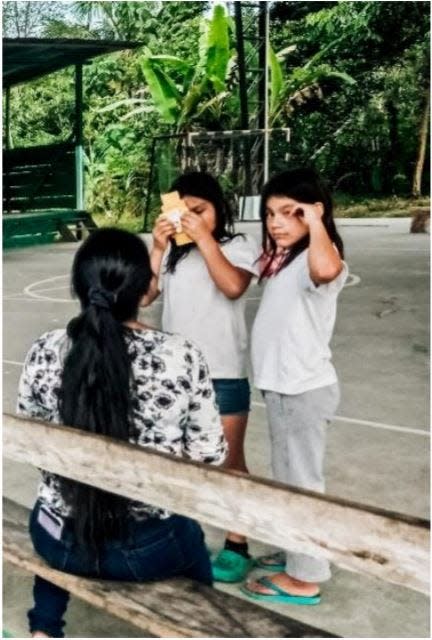The eyes have it. Southborough Rotary donates paper microscopes to Ecuador students
SOUTHBOROUGH — To reach schools in the communities surrounding the city of Puyo, deep in the tropical rainforest of eastern Ecuador, visitors from the capital of Quito have to travel all day by car and boat.
Volunteers from the Rotary Club of the Ecuadorian city of Ambato, in cooperation with the Foundation for the Conservation of Aquatic and Terrestrial Biodiversity (FUCOBI), completed that difficult journey on Oct.1 to deliver 21 foldscopes — microscopes made of paper — donated by Southborough Rotary Club.
“There are no science labs in Ecuador,” said Dr. Acacia Warren, president of the Southborough Rotary Club. “Children (in Ecuador) are not exposed to any classes on science, and there’s just a lack of educational opportunity to do hands-on scientific research.”

Warren, an immunobiologist and a veterinary doctor born and raised in Chone, Ecuador, has been active in keeping in touch with her native country.
In 2010, she organized a scientific expedition with her students at Tufts University along the western coast of Ecuador to study the congenital consequences of exposure to toxic materials.
She has since built a long-lasting relationship with FUCOBI, through which she wants to help Ecuadorian communities that continue to be threatened by poor environmental conditions.

Warren first heard of foldscopes in October 2020, and immediately realized the benefit of Ecuadorian communities using them.
Foldscopes are made entirely of paper. They incur a manufacturing cost of about $1, sell on the retail market for $3.50, weigh less than two nickels and work as well as a lab microscope with a magnification of about 140 times, according to Foldscopes Instruments Inc's website.
Once the pieces are assembled, users insert sample slides to get their science on.
Three thousand miles from Southborough, Iris Hernandez, executive director at FUCOBI, received the first package of foldscopes in September, and on Oct. 1 she set out on a trek with volunteers toward the Amazon.
Three schools have received the first foldscopes — U.E.I. Rogers Mc. Cully and U.E.I.B. Gabriel López schools in Arajuno, and CECIB Río Aguarico in Shiwakucha.
Each school consists of 10 to 30 students ranging from 9 to 17 years old who have shown great interest in the foldscopes, according to Hernandez.
Based in Baños de Agua Santa, four hours from the schools, Hernandez said students have mostly used the foldscopes to observe insects — but the benefits go beyond the classes.
Since their newly installed water pump, they have also been taught by teachers to examine water droplets to judge the drinkability the water.
"We cried with the students when we received them, because nobody was expecting them," said Hernandez. "With the foldscopes, students can now see if they actually can drink the water pumped since mid-October from the Arajuno River, when before they would walk to collect water."
Designed at Stanford University by Manu Prakash and Jim Cybulski, foldscopes were made available in 2017 with the goal of making scientific observations without the costly and bulky inconveniences of a regular microscope, according to Foldscope Instruments, which is headquartered in Palo Alto, California — the same community as Stanford.

More than 1.3 million foldscopes have been delivered to more than 140 countries with the purpose of making the evaluation of water quality much easier, according to Ken Ta, a Foldscope Instruments representative, who was excited to hear about the Rotary Club’s contribution.
“It's truly inspiring,” he said. “As a social mission-driven company, we are thrilled to see our products being used as it was intended — to make science and STEM (science, technology, engineering and mathematics) education equitable and accessible for everyone.”
One hundred more foldscopes were delivered last month, but they are stuck in a process stalled by COVID-19, said Hernandez.
In the future, she also hopes to supply 100 foldscopes per province along the coast of Ecuador but also the north, along the border with Colombia, even though the latter suffers the dangers of guerrilla control.
"With some areas, it's kind of hard because they're not safe," said Hernandez. "I'm also a mom of a son who's 1 year and almost 5 months who goes with us everywhere we go."
At the Southborough Rotary Club, members including Carl Guyer, are collecting bottles and cans to raise money for foldscopes that will be sent to Ecuador in the future.
“I can still remember when I was a sophomore in high school, walking into biology class, looking into a microscope and seeing a living organism — a paramecium,” said Guyer. “I understand how these things can change and inspire people, and we have to make this bigger because it has a really big impact."
Since the delivery, students in Ecuador have shown their appreciation through a Nov. 16 video.
“Ecuadorian kids just smile and dance, and they are just so happy,” said Warren. “I am so proud of being a Rotary member.”
The Southborough organization is one of 46,000 such clubs that are part of an international membership that comes to the aid of communities in need all over the world, according to the Rotary Club website.

Their work aims to “unite and take action to create lasting change — across the globe, in our communities, and in ourselves.”
A strong believer in education as a means to escape poverty, Warren said the foldscopes will open a window for younger people in Ecuador, especially those more vulnerable to COVID-19.
She hopes to send 350 more.
“I only hope that I can help the children from Chone, where I was born, but they are not in line yet — we need to go to the more serious areas,” said Warren. “I really want us to continue this effort."
This article originally appeared on MetroWest Daily News: Southborough Rotary Club donates paper microscopes to Ecuador

